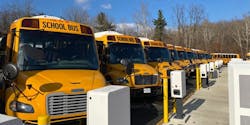CPower, Highland Electric Fleets partnering on Vehicle to Grid services from EV School Bus Fleet
Energy management firm CPower will help convert the nation’s largest electric school bus fleet to help provide grid services in vehicle to grid technology.
CPower Energy and Highland Electric Fleets are partnering to utilize the electric bus fleet at Maryland’s Montgomery County Public Schools. The collaboration will work on enabling demand response solutions to help reduce electrical load using electric school buses supplying back into the grid.
"We are thrilled to partner with Highland to leverage their EVSB depots as flexible and clean distributed energy resources to support the grid when called upon for reliability and to unlock an entirely new revenue stream," said John Horton, CEO and President, CPower. "Our partnerships with EV fleet owners, charging operators, and local school districts across the country demonstrate that participation in grid services programs can substantially lower electrification costs, while supporting a local community's resiliency and greening the grid."
One key facet of electrifying school bus fleets is that they ran on consistent daily schedules and can be factored in to provide grid resiliency services, the companies say. CPower will manage the flow of electricity to the EVSB charging stations to reduce demand on the grid when needed.
The transmission system operator for that region, PJM Interconnection, recently updated market rules to allow for EV charging assets to participate in its capacity and ancillary services markets, but does not yet allow bi-directional charging assets to participate, which would optimize environmental benefits by allowing the EVSB batteries to export additional clean energy capacity to the grid.
CPower hopes that with FERC Order 2222 and other policy advancements, they will be able to unleash even greater value from these assets in the future. FERC 2222 pushes system operators to allow aggregated distributed energy resources to compete in the wholesale electricity markets.
